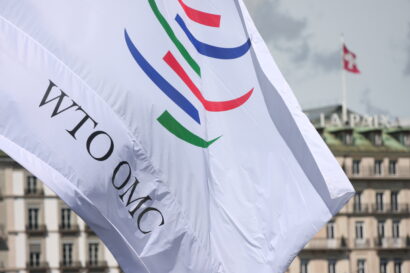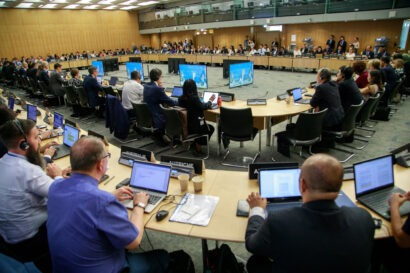With the increasing digitalisation and servitisation of the economy, the debate on how to tax cross-border services is more lively than ever before. While a global solution is needed, recent events in the international tax arena seem to indicate that a global tax governance framework does not yet exist. However, with an Inclusive Framework plenary meeting currently underway this week, I wonder: is it illusory to expect one?
The current context
In relation to international tax standards, Prof. Schön once wrote “[t]he current system is a compromise, and the future system will be as well”. While in the 1920s compromise was achieved by a limited group of the most developed economies at the time under the post-World War I League of Nations, the current situation is very different. The extreme globalisation and digitalisation of the economy today demands setting stable international tax standards fit for purpose under a global tax governance framework.
Though we may all agree on this, such a global compromise will not easily take shape. Indeed, the effectiveness of the OECD/G20 Inclusive Framework on BEPS (IF) seems to be on a knife edge: While negotiations do not seem to have sufficiently considered developing economies’ realities and concerns, the host country of a great number of multinational businesses (the U.S.) is not providing signs of real adherence.
The “ground-breaking tax deal for the digital age” announced by the OECD last October when members of the IF (except for Kenya, Nigeria, Pakistan and Sri Lanka) joined the Two-Pillar Solution, may not materialise, at least in full.
Despite the immense efforts IF members are dedicating to complete drafting the multilateral convention (MLC) necessary this month, the Two-Pillar Solution’s implementation as a package seems unrealistic. This is not only due to the fact that the U.S. may not sign the convention, or that the redistribution of taxing rights promised under Pillar One doesn’t satisfy the expectations of developing countries, but also because of its complexity.
Unaddressed issues
Pillar Two was a rushed, politically-driven proposal that diverted attention from developing countries’ main concern, which Pillar One was supposed to address: establishing fairer nexus and profit allocation rules.
However, Pillar One could not have properly addressed this concern, as its rules were designed based on a biased diagnosis introduced in the Report on BEPS Action 1 by OECD and G20 jurisdictions in 2015 and never updated. The diagnosis did not take into account tax practices beyond the standards delineated by the OECD: taxation of business profits in the jurisdiction of residence and/or site of a permanent establishment, as well as the separate entity and arm’s length principles. Methods including taxation at source, presumptive taxation, and withholding mechanisms were not considered.
In Latin America, there has for many years been an increasing trend of introducing provisions within the income tax system based on the “source of payment” criterion, which links the source of an item of income to the place of residence of the payer. This has recently been backed by the United Nations with the introduction of Articles 12A (Technical Services) and 12B (Automated Digital Services) to its model tax convention. Uruguay for example, has relaxed the traditional approach to the definition of source for technical and advertising services, whether digital or not. Across the region, which does not have an extensive tax treaty network, countries have for decades recognised that foreign businesses that carry out activities within their borders are taxable on a notional amount whether or not a permanent establishment exists.
Yet, it was not until the end of last year that the Steering Group of the IF and the OECD Secretary mandated the Task Force on the Digital Economy to start discussing how to address the interaction of the rules designed so far with the existing income tax measures that deviate from the OECD standards. Discussions are ongoing, but the diversity of national tax systems and lack of clear common principles makes this task nearly impossible from a technical point of view.
A brighter future?
The turmoil in the international tax landscape bring to mind a question posed in 2014 by Prof. Martin Jiménez and Prof. Calderón Carrero, referring to the BEPS Action Plan: 2[t]he end, the beginning of the end or the end of the beginning?” Why are we still experiencing so much uncertainty after almost one decade of “inclusive” work on the taxation of the digitalised economy?
Likely due to the potentially disappointing results of the IF, the UN General Assembly has resolved to explore alternatives to tax cooperation. Last December the Assembly adopted, at the initiative of African countries and with the support of the majority of the developing world, a resolution on promoting inclusive and effective international tax cooperation. This may eventually lead to “developing an international tax cooperation framework or instrument that is developed and agreed upon through a United Nations intergovernmental process”. The resolution requested that the Secretary-General prepare a report “to set the scene” taking into full consideration existing international and multilateral arrangements and to consult widely with relevant stakeholders. These consultations are already taking place.
Opposing developed countries have urged instead for continued focus on negotiations at the IF, arguing that discussions at the UN will duplicate work and undermine the ongoing negotiations. However, even if negotiations manage to deliver the MLC, the implementation of Pillar One seems condemned to fail.
While the African Tax Administration Forum represented its members excellently during the IF discussions on the two-pillar package, Latin America and the Caribbean did not define its common interests and seek to influence the debate as a region. This is now changing with the First Latin American and Caribbean Summit for an Inclusive, Sustainable, and Equitable Global Tax Order, which was recently launched by the Colombian Ministry of Finance and Public Credit. The intention is to establish a regional framework that can play a role like the one ATAF has played.
These developments signify the intention to work on addressing the challenges in a truly comprehensive manner, an approach the OECD failed to adopt in due time. I hope that these initiatives will go beyond intentions and lead to real developments that will help materialise a true global tax governance framework that provides both inclusive and effective solutions for the taxation of the services economy.



